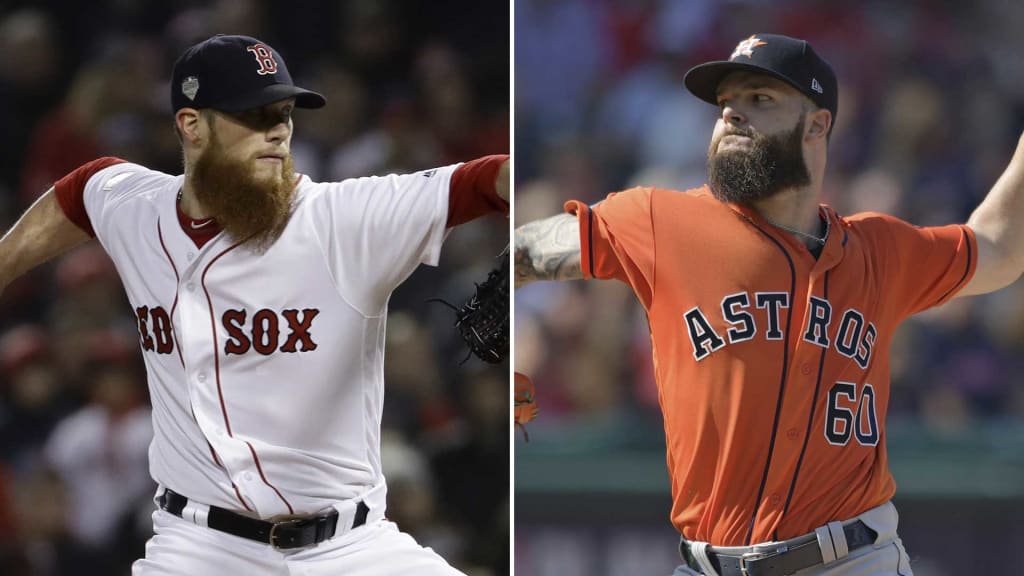
The calendar is about to flip to June, and still, two of this past offseason¡¯s top free agents remain unsigned.
Left-hander Dallas Keuchel has a Cy Young Award, a World Series ring and two All-Star selections. Right-hander Craig Kimbrel has been one of the most dominant closers in baseball history. Yet neither has found a home for 2019, roughly one-third of the way into the season.
That could change soon, thanks to the arrival of the MLB Draft, which begins Monday at 7 p.m. ET, and runs through Wednesday.
Because the Astros made Keuchel a one-year, $17.9 million qualifying offer in November, and the Red Sox did the same for Kimbrel, both players had their free agencies tied to Draft compensation. When a player rejects a QO and then signs with a new team, that team is subject to a penalty that affects its Draft picks.
Given the value clubs place on those picks -- and the young talent they produce -- these penalties serve as a deterrent. However, if a team waits until the Draft, those penalties disappear. Therefore, the pursuit of Keuchel and Kimbrel could heat up quickly over the next week, with pitching-starved teams looking for an upgrade without the extra cost.
But what else is there to know about the situation facing these two free agents? Here are some questions and answers.
When can they sign without them costing the signing team a pick?
Kimbrel and Keuchel can sign as of 12:01 a.m. ET on the day of the first round of the Draft without affecting the Draft order. In other words, the penalties expire as of the wee hours of Monday morning.
Why is this a big deal?
Penalties actually used to be more severe, with any team that signed a QO-rejecting player giving up its top selection, unless it was in the top 10 (in which case that club surrendered its second pick of the Draft).
Those rules were loosened a bit in the latest collective bargaining agreement, with the new guidelines taking effect for the 2017-18 offseason. Now no team can lose its highest first-round pick for signing a free agent.
However, penalties remain and are dictated by a couple of factors. The standard cost is that a club signing one eligible free agent loses its second-highest selection and $500,000 from its international bonus pool for the upcoming signing period. A team that spent enough in free agency to go over the luxury tax threshold also loses its fifth pick and extra bonus pool money, but one in a smaller market that receives revenue sharing only has to part with its third selection.
Despite that change, the penalties can give teams pause. While it¡¯s more difficult to draft an impact player with a lower pick, it¡¯s also tough to pass up that opportunity. For example, in 2015, the Braves used their second pick (No. 28 overall) on pitcher Mike Soroka, who four years later is leading their rotation. In ¡®16, the Mets took slugger Pete Alonso with their third selection (No. 64).
Who are the teams that are most affected by this?
Here are five clubs that would figure to be in the mix for Keuchel and/or Kimbrel, and now could see the cost drop.
Braves: They could bring back Kimbrel to bolster a shaky bullpen, or even add Keuchel as veteran rotation protection. While Atlanta only would have lost the 60th overall pick by signing one before the Draft -- as a revenue-sharing recipient, the Braves lose their third selection -- the bigger issue would have been the more than $1.1 million in bonus pool money associated with it. Losing that would give Atlanta less flexibility with its first two picks (No. 9 and No. 21), while it already is dealing with limitations on the international market due to rules violations.
Mets: They could use bullpen or rotation help but dug into their prospect depth in the offseason by trading two top-100 prospects for Edwin Diaz and Robinson Cano. Following that up by sacrificing their second pick (No. 53) would have been a tough pill to swallow for a club that just a few years ago nabbed Alonso in a similar spot.
Twins: A team that wasn¡¯t sure if it was a contender on Opening Day now holds a commanding division lead but still could stand to strengthen its pitching. The Draft¡¯s arrival would prevent the Twins from losing the 54th overall pick (their third overall), a consideration for a club that tends to emphasize player development over big free-agent moves.
Rays: Tampa Bay certainly could use pitching help as it battles for AL East supremacy, but like Minnesota would hesitate to give up a valuable Draft pick as it looks to continually build a team on a small budget. The cost would have been even higher for the Rays (the No. 40 pick, their third overall), who not so long ago picked reigning AL Cy Young Award winner Blake Snell at No. 52.
Yankees: With Luis Severino still out and some other pitchers banged up, Keuchel could have appeal for New York. But until the Draft he would cost them the No. 38 overall pick, plus nearly $2 million in bonus pool money, and international money. That would give them the largest total penalty, according to calculations done by FanGraphs.
Is there precedent for this kind of thing?
Yes, but not much. In 2014, before the Draft penalties were relaxed, free agents Stephen Drew and Kendrys Morales languished on the market well into the regular season.
Drew ultimately signed a one-year deal in late May, but because he returned to the same team (the Red Sox), Boston did not have to forfeit any picks. Morales, on the other hand, didn¡¯t sign with the Twins until June 8, just after the Draft. Both players struggled mightily with the late start to the season and ended up getting traded before the July 31 Deadline. Drew finished the year with a .536 OPS, and Morales with a .612 mark.
While two hitters¡¯ performances don¡¯t guarantee how two pitchers will fare five years later, that limited record still could have given teams pause, along with the Draft penalties. The concerns about a late start will remain, but as of Monday morning, the latter barrier will be gone.
